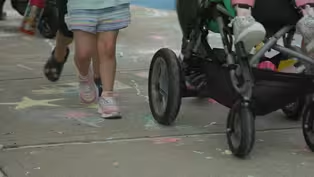
Swimming Upstream
Clip: Season 4 Episode 39 | 8m 43sVideo has Closed Captions
The fight for swim safety in Rhode Island.
Many Rhode Islanders spent their summers swimming in the surf. But a surprising number of American children can’t swim. And racism has played a role in barring generations of swimmers from pools. Isabella Jibilian explores the fight for swim safety in Rhode Island.
Problems playing video? | Closed Captioning Feedback
Problems playing video? | Closed Captioning Feedback
Rhode Island PBS Weekly is a local public television program presented by Ocean State Media

Swimming Upstream
Clip: Season 4 Episode 39 | 8m 43sVideo has Closed Captions
Many Rhode Islanders spent their summers swimming in the surf. But a surprising number of American children can’t swim. And racism has played a role in barring generations of swimmers from pools. Isabella Jibilian explores the fight for swim safety in Rhode Island.
Problems playing video? | Closed Captioning Feedback
How to Watch Rhode Island PBS Weekly
Rhode Island PBS Weekly is available to stream on pbs.org and the free PBS App, available on iPhone, Apple TV, Android TV, Android smartphones, Amazon Fire TV, Amazon Fire Tablet, Roku, Samsung Smart TV, and Vizio.
Providing Support for PBS.org
Learn Moreabout PBS online sponsorshipWhy are you putting money into other things but my kids who can't fend for themselves are not worth it?
That's sad.
- Governor McKee has not yet weighed in on whether he will propose a Medicaid rate increase in his upcoming budget in January.
And just weeks after our interview in August with Olivia Ippolito, she was able to get her son, Levi, into private daycare allowing her to go back to work.
You can read more about this story in the Boston Globe at globe.com/ri.
- Up next, many Rhode Islanders spent their summers splashing in the ocean but studies show that a surprising number of American children cannot swim.
In our next story, producer Isabel Jibilian reports on the often tragic issue of swim safety and how some Americans are at greater risk than others.
- One night, phone call, woman sobbing on the phone telling me that her child had drowned at five o'clock at Lincoln Woods.
- [Isabel] It was the early 90s and Ray Rickman was a Rhode Island state representative.
- And the coroner had his body and would not release it.
She was Islamic.
And I know enough about religion to know you're supposed to be buried within 24 hours.
I called the coroner and he wouldn't release the body.
In fact, he hung up on me and I walked over to the Capitol, two blocks, saw the governor without appointment and said, "Governor Sundlun, I need you to get this done."
- [Isabel] Rickman was able to get the teenage boy's body released but he couldn't forget this mother's pain.
- She watched her son drown.
She could not swim.
Can you imagine?
You can't imagine.
- In the United States, an average of 11 people are drowning every day.
So we're losing 4,000 people a year to drowning.
It's the leading cause of death for children from one to four.
- [Isabel] Mara Gay was an avid swimmer growing up.
Today she's on The New York Times editorial board.
- Drowning is something that affects Americans of all backgrounds.
However, it does disproportionately affect minorities and in particular, Black and native communities.
- [Isabel] According to the Centers for Disease Control and Prevention, Black children are 1.5 times more likely and Native American children are two times more likely than white children to die of drowning.
Gay says, for African Americans, the gap is rooted in history.
- It goes really deep.
So Black Americans, many people know were not allowed to learn how to read during slavery.
Many times they also weren't allowed to learn how to swim.
And that's because it would've made it easier to escape to freedom.
Dogs couldn't track your scent in water which was known among enslaved Americans.
During segregation, you had public pools that were not open to Black Americans.
- [Isabel] And after segregation, many Black Americans were still unwelcome.
Storyteller of V. Raffini grew up in Rhode Island.
- We were like around nine, 10.
This was '68, '69.
Pools weren't segregated but they were racist.
And when we got there, we dealt with the racism.
We've had our lunches stolen, we've had them smashed, spin on our food and leave it so you could see this.
I can remember them calling us names like the walking Tootsie Roll or there's a Hershey bar in the in the pool.
And all straight out coming out with the N word.
It was shocking to us and it hurt our feelings but also made us angry.
So we end up getting into fights at the pool and getting kicked out of the pool and not able to come back for that summer.
- [Isabel] Intimidation wasn't the only way African Americans were driven out of pools.
- Many communities across the south, but also elsewhere unfortunately, chose to fill in, destroy or close their public pools rather than allow Black Americans to swim in them.
So white wealthier Americans who were able to started forming their own clubs, their own neighborhood associations that were of course, segregated and the rest of America was shut out.
You would never take similarly your child and put them in a car without a car seat.
And yet, we find it completely acceptable in American society to allow generations and millions of children to grow up without learning how to swim or be safe around the water.
- [Isabel] In Rhode Island, multiple generations of the Willis family are working to reverse that trend through their business Orca Aquatics.
Wayne Willis- - Do 1:25, just focus in.
- [Isabel] And his son Dylan.
- One, two, three, four.
- [Isabel] Coach the swim team.
Wayne's daughter Sydney and wife Joanna teach lessons and his sister Leslie manages arriving families.
Some of their students are able to learn for free, thanks to Ray Rickman.
- Our number one goal is to teach now low-income children to swim and to avoid drowning.
- [Isabel] He started a program called Swim Empowerment to sponsor swim lessons for Black and low-income youth.
It was a promise to a heartbroken mother.
- This is my commitment to her.
- [Isabel] He raises money for the effort at his bookstore and museum Stages of Freedom.
- Here's first edition, "A Story of Race and Inheritance".
It is autographed by Barack Obama and the last one sold for 4,200.
When you get 5,000 bucks, that's 50 kids learning how to swim from one book.
You go, are you kidding me?
- [Isabel] 2,600 children have learned to swim through his program so far.
Some go to Orca Aquatics, others to the YMCA, but lessons are only the beginning.
- I have these five year old Black kids say to me, "Okay, Mr. Rickman, will you pay for me to join the Y now?
"Those five people I was swimming with, "they're all joining the Y next week, can you pay for me?"
I say, "No, I don't have the money."
- I've spent a lot of time calling for more free swim lessons.
I believe firmly that that's a part of the solution.
But what I've found is actually that the reason so many Americans can't swim is because they don't have safe places to learn to do so.
Public pools are the critical piece of this puzzle.
So it would be the equivalent of calling for education for all Americans without having any schools.
- [Isabel] Orca Aquatics has felt that squeeze.
In August, a chlorine explosion occurred at the North Providence Pool closing the facilities where they usually ran programs.
For weeks, they called countless pools across the state and were repeatedly turned away.
Until the problem is fixed, they're practicing at Rhode Island College's pool but have had to cut back swim lessons from seven days a week to three.
The shortage of pools has inspired Ray Rickman to pursue a new dream.
- And we're doing the first draft of a proposal to build a $20 million Olympic plus swimming pool for the people of Providence to come free to swim.
And again, I told you it's for everybody, the richest people on the east side and the lowest income folks from Silver Lake.
And we're gonna get it done.
- [Isabel] The next steps, Ray Rickman needs to get Rhode Island Senate President and Speaker of the House on board so that the pool can eventually be added to the state budget.
- Swimming is one of the most exciting things you can do.
You don't know that until you do it.
That's what I hope for this whole community.
(soft upbeat music)
Video has Closed Captions
Clip: S4 Ep39 | 8m 26s | Infants and toddlers with developmental disabilities forced to wait for critical services. (8m 26s)
Video has Closed Captions
Clip: S4 Ep39 | 9m 14s | Meet a local puppeteer, video game developer and creator of RIPBS kid’s show Pollywog Pond (9m 14s)
Providing Support for PBS.org
Learn Moreabout PBS online sponsorship
- News and Public Affairs

Top journalists deliver compelling original analysis of the hour's headlines.

- News and Public Affairs

FRONTLINE is investigative journalism that questions, explains and changes our world.












Support for PBS provided by:
Rhode Island PBS Weekly is a local public television program presented by Ocean State Media

